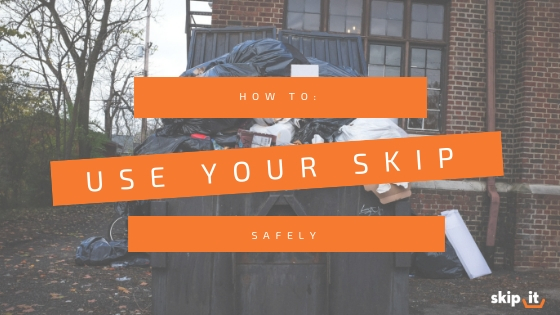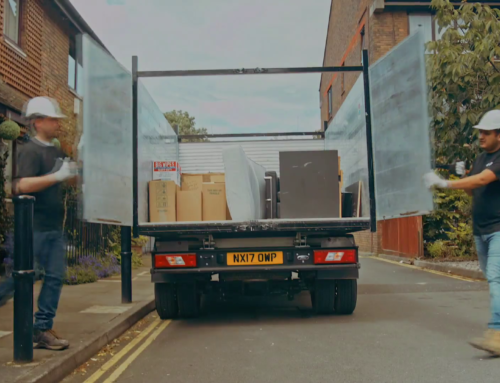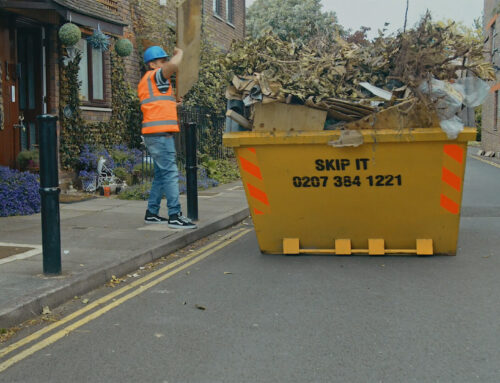If you are in the middle of a waste clearance project and you’ve ordered a skip, it’s important that you are aware of the health and safety precautions to follow when you’re using it. There’s no need to have commercial experience when it comes to safely loading up your skip, but there are some best practices that you should bear in mind for your skip hire.
These will help you to minimise the risk of causing injury to yourself or others and it will also make it much easier for your Skip It team to collect, clear and load your skip during house clearance services and business waste collection services.
Read on to discover how to use your skip safely during a waste clearance project and don’t forget to get a quote from us for skip hire pricing today.
Prep the area where your skip will be located
It’s a good idea to clear any rubbish or obstructions from the location to ensure that you have a space big enough to accommodate your skip during your waste clearance project. You should also take care to remove any rubbish or obstructions that are nearby your skip, as these could prove hazardous when it comes to collecting your skip or during the waste clearance process.
The best way is to measure the area and make sure it is flat, stable ground that isn’t too wet or marshy, as heavy skips have been known to sink!
How to avoid overloading a skip?
When you are removing the waste from your own home or business, the safest way to prevent your skip being overfilled is to ensure that you pay attention to the marked load line inside your skip, any waste that goes over this line will mean that your skip is overfilled.
You must also pay close attention to the weight of the waste that you place in your skip, especially if you’ve ordered a large one. This makes it much easier for your friendly Skip It team to collect, clear and load your skip for waste clearance.
When a skip is overloaded, it can become too heavy and it mightn’t be able to fit on the skip lorry, which is designed to only take a certain weight. If your skip is overloaded, it can make it dangerous for us to transport and we may arrange for an additional skip and lorry to collect your waste if we think your skip is overfilled.
Don’t worry, if you are unsure as to what size of skip you will need, we are here to help and can also offer advice on other areas relating to your skip hire, such as our waste management permits and much more. Contact us today for help on skip service pricing, waste collection and much more.
Make a note of our waste restrictions
There isn’t much waste that we won’t take off your hands. We are happy to collect rubble, hardcore waste, furniture, garden waste and even hazardous waste such as asbestos, poisonous chemicals, flammable materials and batteries.
Unfortunately, we can’t collect any liquid waste such as oil, diesel, petrol, paint and liquid cement. We also kindly advise you not to fill your skip with medical waste, toxic gasses, explosives or weapons.
Use a skip ramp
The easiest way you can ensure skip safety is to use a skip ramp when you are filling it up with your waste, especially if your waste can easily fit inside a wheelbarrow, such as bricks, soil or rubble. A TUV certified ramp can be used safely at a 30 per cent gradient. The easiest way to work out the correct skip ramp for your skip is to multiply the height of your skip by 3.3.
Put the heavies in the skip first
The safest way to fill your skip is to put the bulky, heavier items in first and put the lighter items in nearer the top. And make sure your waste is laid flat inside the skip where possible. This is important because it will prevent the items from moving around dangerously and it will help to keep your skip stable during loading and transportation.
It’s also a good idea to break up bulkier items before you put them into your skip. This will conserve space and make sure it’s all packed in safely. If you have furniture that can be dismantled, it’s a good idea to do so to reduce the occurrence of large gaps that could take up a lot of room inside your skip. This will also help you control the amount going into your skip and prevent it from being overloaded.
To find out more about how we can help you hire a skip, contact our friendly team today. Further reading:









Leave A Comment